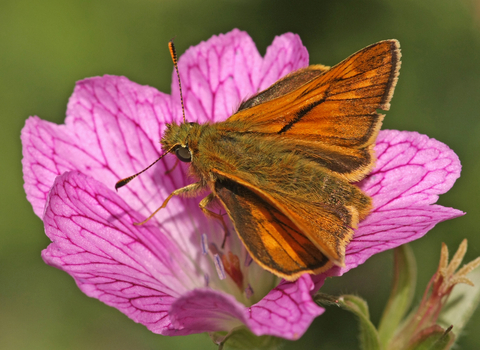
©Rachel Scopes
Large skipper
As its name suggests, the large skipper is bigger than the similar-looking small skipper! It can be seen in summer, resting on the long grass of grasslands, woodlands, verges and sand dunes.
Scientific name
Ochlodes sylvanusWhen to see
June to AugustTop facts
About
The large skipper is a small, orange butterfly, similar to the small skipper. Adults fly between June and August, when they can often be seen resting in sunny positions and long grass, or feeding on flowers such as bramble. Large skippers can be found on rough grassland and sand dunes, along roadside verges and woodland edges, in large gardens, or anywhere else with plenty of grasses. They lay their eggs on grass blades. Foodplants of the caterpillars include cock's-foot, purple moor-grass and false broom.What to look for
The large skipper has russet-brown wings edged with large, dark brown patches and dotted with small, light orange patches. This pattern helps distinguish them from the small and Essex skippers. Males have a small black stripe in the middle of their forewings.Where to find
Found in England, Wales and southern parts of Scotland.Did you know?
Large skipper caterpillars hatch in late June and feed until September. They go into hibernation as a half-grown larva, emerging the following spring to feed and metamorphose.Watch
Large skipper (https://vimeo.com/473859243)
Large skipper ©Tom Hibbert
